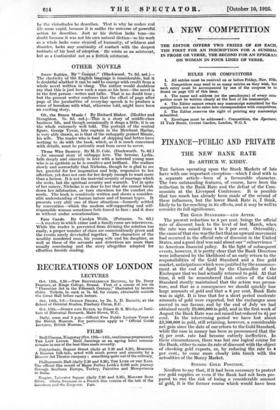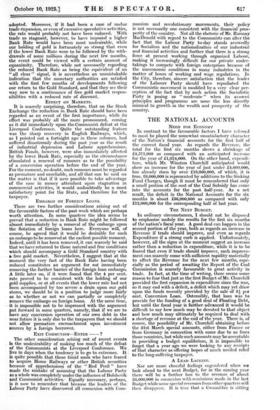FINANCE-PUBLIC AND PRIVATE
THE NEW BANK RATE
BY ARTHUR W. KIDDY.
THE factors operating upon the Stock Markets of late have with one important exception—which I deal with in a separate article—been of a favourable character. The two outstanding features, of course, have been the reduction in the Bank Rate and the defeat of the Com- munists at the Liverpool Conference.- It is- possible that too much has already been made of the -second of these influences, but the lower Bank Rate is, I think, likely to be far-reaching in its effects, and it may be well to consider its full significance.
THE GOLD STANDARD—AND AFTER.
The present reduction to 4 per cent, brings the official rate of discount back to the level of last March, when the rate was raised from 4 to 5 per cent. Ostensibly,1 the cause of that rise was the fact that an upward movement had occurred in the official rate of discount in the United States, and a good deal was said about our " subservience , to American financial policy. In the light of subsequent: events, however, it is pretty clear that the Bank Directors; were influenced by the likelihood of an early return to the responsibilities of the Gold Standard and a free gold market, anticipations which were justified by the announce- ment at the end of April by the Chancellor of the Exchequer that we had actually returned to gold. At that time, it will be remembered that critics of the Gold Standard stoutly maintained that the action was prema- ture, and that as a consequence we should quickly lose large amounts of gold and that a 6 per cent. Bank Rate was in sight. It is true that for a short period moderate amounts of gold were exported, but the exchanges soon moved in our favour, and by the end of July we had obtained nearly £9,000,000 in gold, and in the first week of August the Bank Rate was not raised-but reduced to 44 per cent. In the intervening period we have lost about £3,500,000 in gold, still retaining, however, a considerable net gain since the date of our return to the Gold Standard, while the ease in money has been SQ pronounced.that the 44 per cent. rate had become entirely ineffective. In these circumstances, there was but one logical course for the Bank, either to raise its rate of discount with the object of checking gold exports, or, by reducing the rate to 4 per cent., to come more closely into touch with the actualities of the Money Market.
• STRONG • GOLD POSITION. _ Needless to say that, if it had been necessary to protect our gold supplies or even if the Bank had not been pre- pared to run the risk of losing a considerable amount of gold, it is the former course which would have been EMBARGO ON FOREIGN LOANS.
There are two further considerations arising out of the favourable factors of the past week which are perhaps worth attention. In some quarters the idea seems to prevail that a reduction in Bank Rate might be followed almost immediately by a removal of the embargo upon the flotation of foreign loans here. Everyone will, of course,- be agreed that it would be desirable for such an embargo to be removed at the earliest.possible moment. Indeed, until it has been removed, it can scarcely be said that we have returned to those natural and free conditions which should accompany a Gold Standard country with a free gold market. Nevertheless, I suggest that at the moment the very fact of the Bank Rate having been reduced constitutes an argument for not immediately removing the further barrier of the foreign loan embargo. A little later on, if it were found that the 4 per cent. rate proved to be consistent with the holding of our gold supplies, or at all events that the lower rate had not been accompanied by too severe a drain upon our gold stores, we should be in a position to judge more fairly as to whether or not we can partially or completely remove the embargo on foreign loans. At the same time, it is impossible not to be -impressed with the argument put forward in some quarters, namely, that if we are to have any conversion operation of our own debt in the near future it is only due to the taxpayers that we should not allow premature encroachment upon investment sources by a foreign borrower.
Exrr COMMUNISM—ENTER — ?
The other consideration arising out of recent events is the undesirability of making too much of the defeat of the Communists at the Liverpool Conference. We - live in days when the tendency is to go to extremes. It is quite possible that those timid souls who have feared to acquire Home Railways or other British securities because of apprehensions of the " Red Peril " have made the mistake of assuming' that the Labour Party as a whole was completely under the influence of Bolshevik and -Communist activities:- Equally necessary, perhaps, is it now to remember that because the leaders of the Labour Party have disavowed all connexion with Com- adopted. Moreover, if it had been_ a case of undue trade expansion, or even of excessive speculative activities, the rate would probably ,not have been reduced. With trade so stagnant, however, to have imposed a higher Bank Rate would have been most undesirable, while our holding of gold is fortunately so strong that even if the lower Bank Rate were to be followed by the with- drawals of some millions during the next few months, the event could be viewed with a certain amount of equanimity. Therefore, while not necessarily regarding the reduced Bank Rate as being the equivalent of an " all clear " signal, it is nevertheless an unmistakable indication that the monetary authorities are satisfied with the first few months of developments following our return to the Gold Standard, and that they see their way now to a continuance of free gold market respon- sibilities with a reduced rate of discount.
EFFECT ON MARKETS.
It is scarcely surprising, therefore, that on the Stock Exchange the reduction in Bank Rate should have been regarded as an event of the first importance, while its effect was probably all the more pronounced, coming as it did immediately upon the Communist defeat at the Liverpool Conference. Quite the outstanding feature was the sharp recovery in English Railways, which, as I pointed out a fortnight ago in these columns, had suffered disastrously during the past year as the result of industrial depression and Labour apprehensions. British Funds, however, were also immediately affected by the lower Bank Rate, especially as the circumstance stimulated a renewal of rumours as to the possibility of a conversion operation before the end of the year. For the moment, no doubt, such rumours must be regarded as premature and unreliable, and all that can be said on the matter is that if it were possible to take advantage of the ease in money attendant upon stagnation in commercial activities, it would undoubtedly be a most satisfactory point for the State, and therefore for the taxpayer. munism and revolutionary movements, their policy is not necessarily one consistent with the financial pros- perity of the country. Not all the rhetoric of Mr. Ramsay MacDonald with regard to the Communists can alter the fact that the Labour Party to-day stands avowedly for Socialism and the nationalization of our industrial and financial activities and further that there is a strong force at present working through organized Labour, making it increasingly difficult for our private under- -takings to compete with foreign enterprises because ol the uneconomic conditions in many industries in the matter of hours of working and wage regulations. In the City, therefore, sincere satisfaction that the leader of the Labourr Party should have repudiated the Communistic movement is modified by a very clear per- ception of the fact that by such action the Socialistic Party is posing as " moderate " when its avowed principles and programme are none the less directly inimical to growth in the wealth and prosperity of the country.



























































 Previous page
Previous page